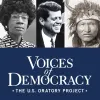Take a look inside 5 images
Voices of Democracy
Pros: Go-to collection of primary source speeches spans the political spectrum and U.S. history.
Cons: This resource is best for professional development, not grab-and-go lessons, so you'll need time to make the most of it.
Bottom Line: A great place to begin when you want to make history feel more real, but "begin" is the operative word; plan on creating your own scaffolding.
Given Voices of Democracy's rich collection of material, it's a great site to explore over the summer or during school breaks -- it's the kind of resource you plan a year around, not one you use to find sponge activities. First consider the themes and events you need to cover over the year and then begin your research.
As the majority of speeches are dense in text, and from an unfamiliar time period, all students in grades 8-12 will need some scaffolding and pre-teaching -- particularly in vocabulary -- and possibly some jigsaw-type group reading activities. That said, students more adept in research and independent study could simply be given the site's link and be successful. The good news is that the heavy lifting of using the site effectively lies only in the pre-teaching. Once students have a working understanding of a speech, they can be led through the classroom activities, research project ideas, and "Citizenship Resources" with much less front-loading.
Voices of Democracy is an online resource for primary source speeches and supporting curriculum. The extensive collection of speeches ranges in time from Colonial America to the Obama administration, and represents a diverse group of historical figures. Not only will you find presidential addresses, but also the words of prominent leaders and thinkers like Dorothy Day, Shirley Chisholm, Stokely Carmichael, Cesar Chavez, and Harvey Milk.
To navigate the collection effectively, speeches are grouped by topic: Citizenship & Civic Identity, Civil Rights, Freedom of Speech, Religion & Morality in Public Life, Social & Economic Justice, U.S. Internationalism, and War & Peace -- although users can opt to search by an historical figure's name or by time period. The site also features a blog, updated monthly, that connects recent events to speeches in the archive.
Though Voices of Democracy may not do all the planning for you, it certainly gives you a head start. Each speech is accompanied by an interpretative essay, suggested resources, classroom activities, student research project ideas, and "Citizenship Resources," a list of prompts connecting the themes of the speech to current events. The activities will prompt rich discussion and debate; student research project ideas will encourage learner independence; and suggested resources include credible online sources that may feature video and/or audio recordings of the speech.
Most notable here is the commitment to true representation -- a demonstration of democracy's voice. Not only does the curation of speeches and addresses reflect diversity, it shows that it doesn't shy away from the controversial: Louis Farrakhan is included, as is Jim McGreevey and his State House Confession, and Dan Quayle's Murphy Brown speech.













